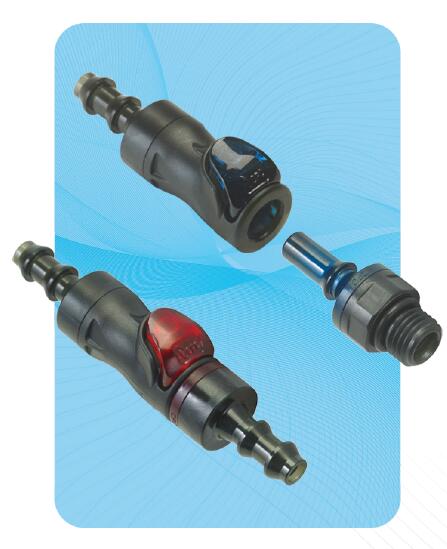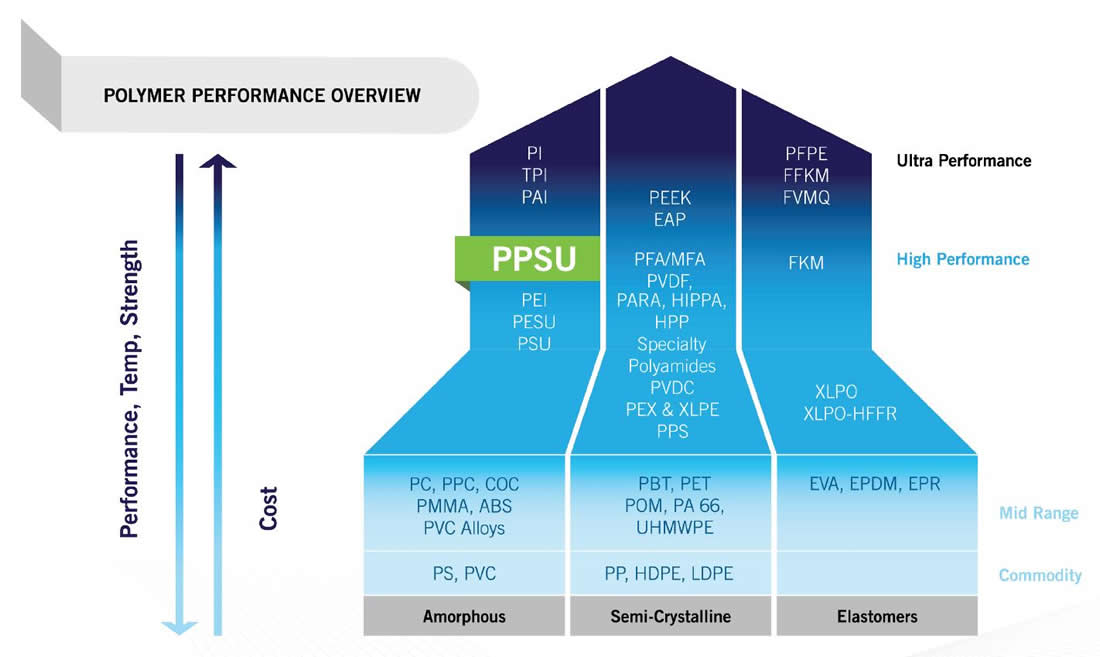
 |
|||
智能流体处理产品带您走得更远更快
Smart fluid handling to take you forward,faster |
|||

|
高性能聚合物在 HPC 和数据中心应用中的使用 -
塑料在液体冷却系统中成为可行、可靠的选择
By
Elizabeth Langer 随着计算能力和密度(以及它们产生的热量)的增加,液体冷却正在成为高性能计算和数据中心应用中首选的热管理方法。 液体冷却可以有效地管理热量,提高能源效率,并且今天的系统足够强大,可以使用而不必担心损坏电子设备。 Liquid cooling is emerging as the thermal management approach of choice in high performance computing and data center applications as computing power and densities—and the heat they generate— increase. Liquid cooling manages heat effectively, improves energy efficiency,and today’s systems are sufficiently robust to allow use without fear of damaging electronics.
然而,这并不意味着系统已经完全优化。 快速发展的高性能计算生态系统中的参与者通常处于使用手头的工具和系统进行部署的位置。 这方面的例子包括: This does not mean systems are fully optimized yet, however. Players in the rapidly evolving high-performance computing ecosystem often have been in the position of deploying with the tools and systems at hand. Examples of this include:
使用空气冷却系统,即使它们在高利用率下充分散热的能力受到挑战。 Use of air-cooling systems, even as they are challenged in their ability to dissipate heat adequately under high utilization rates.
HPC 和数据中心市场的增长导致整个供应链的公司投入研发资金来推进液体冷却业务。 系统内的组件,包括关键的快速断开装置,旨在改进形式和功能。 热工程师可以使用一系列不断扩大的前沿解决方案、创新方法和新材料来解决液体冷却方面的紧迫需求。 高性能聚合物就是一个这样的例子。 The growth of HPC and data center markets has led companies throughout the supply chain to invest R & D dollars to advance liquid cooling operations. Components within the systems, including critical quick disconnects, are targeted for improvement in both form and function. An expanding array of leading edge solutions, innovative approaches and new materials is available to thermal engineers to address urgent needs in liquid cooling. High-performance performance polymers represent one such example.
高性能聚合物改变了对液体冷却塑料的看法 液体冷却系统中的聚合物组件之所以有吸引力,有以下几个原因: 它们重量轻,通常比金属同类产品便宜,并且不受腐蚀,腐蚀会导致部件无法操作或将碎屑引入流动路径。 然而,迄今为止使用的许多聚合物面临的挑战是它们能够在不变形、开裂或蠕变的情况下处理高温和物理压力源。当发生泄漏时,这些缺点会变得很严重,从而导致停机或损坏设备。
HIGH-PERFORMANCE POLYMERS CHANGE THE VIEW OF PLASTICS IN LIQUID COOLING Polymer components in liquid cooling systems are attractive for several reasons: they are lightweight, typically less expensive than metal counterparts, and are impervious to corrosion that can render parts inoperable or introduce debris into flow paths. The challenges with many polymers used to date, however, are their abilities to handle high temperatures and physical stressors without deforming, cracking or creeping.These shortcomings become significant when leaks occur, leading to downtime or damage to equipment.
由于这些缺陷,HPC 制造商和数据中心运营商通常默认使用金属(不锈钢或黄铜)快速断开 (QD) 来满足其液体冷却需求。 全金属或金属塑料混合选项在承受粗暴处理和长时间保持材料稳定性方面表现良好。 虽然耐用,但全金属量子点很容易受到腐蚀。 它们的触感也很热,为设备的热插拔带来了新的意义。 使用它们的系统需要过滤和定期的流体维护,以清除由于腐蚀而产生的潜在碎屑。 As a result of these deficiencies, both HPC manufacturers and data center operators often default to metal (stainless steel or brass) quick disconnects (QDs) for their liquid cooling needs. All-metal or metalplastic hybrid options perform well in terms of withstanding rough handling and maintaining material stability for long periods of time. Though durable, all-metal QDs are vulnerable to corrosion. They’re also hot to the touch bringing new meaning to hot-swapping of equipment. Systems using them require filtration and periodic fluid maintenance to clear out potential debris due to corrosion.
由金属主体和塑料内部阀门组成的混合连接器可以解决其中的一些挑战。 这些 QD 具有金属的强度、耐用性和美观特性,同时避免了关键防溢阀系统中的腐蚀和随后的性能下降。 Hybrid connectors comprised of metal bodies and plastic interior valves work around some of these challenges. These QDs offer the strength, durability and aesthetic characteristics of metal while avoiding corrosion—and subsequent performance degradation—in critical nonspill valve systems.
快速接头的下一个进化发展提供了塑料的优点——重量轻、成本低、防腐蚀和无冷凝——具有与金属相当的坚固性水平。 与这些能力相关的材料是聚苯砜,PPSU。 The next evolution in QDs delivers the benefits of plastics—light weight, lower cost, anti-corrosion and condensation-free—with a level of robustness on par with metals. The material associated with these capabilities is polyphenylsulfone, PPSU.
PPSU 由通过砜 (SO2) 和醚部分连接的亚苯基芳环组成。 这种独特的化学成分促进了增强的性能特性,特别适合液体冷却应用的需求。 鉴于温水冷却系统的新兴流行,聚合物的耐水解性是一个重要因素。 苯砜和醚基均能抵抗水水解,显着提高了 PPSU 在水冷却回路中的整体水解稳定性,进而提高了可靠性。 具有可水解键的聚合物在热水环境中可能存在严重性能退化的风险。 机械韧性和抗冲击性也应该是液体冷却系统中量子点的关键考虑因素; 由于苯醚基团和其他砜(如 PSU 或 PES)中不存在的额外联苯键,PPSU 具有独特的资质,可提供出色的强度和耐用性以及抗冲击性。 PPSU is comprised of phenylene-based aromatic rings linked by sulfone (SO2) and ether moieties. This unique chemistry promotes enhanced performance characteristics that are particularly well suited for the demands of liquid cooling applications. Given the emerging prevalence of warm water cooling systems, polymer resistance to hydrolysis is an important factor. Both phenylene sulfone and ether groups being resistant to aqueous hydrolysis significantly increases the overall hydrolytic stability, and in turn reliability, of PPSU in water cooling loops. Polymers with hydrolysable links may be at risk for severe property degradation in hot water environments. Mechanical toughness and impact resistance should also be key onsiderations for QDs in liquid cooling systems; PPSU is uniquely qualified to provide excellent strength and durability as well as impact resistance due to the phenylene ether groups and the additional biphenylene link not present in other sulfones such as PSU or PES.
优异的耐热性与聚苯砜的高弯曲和拉伸强度、优异的水解稳定性和广泛的化学相容性相结合。 重复的砜基团增强了聚合物出色的热氧化稳定性。 长期暴露在广泛的温度范围内是液体冷却系统中材料选择的关键考虑因素。 可以通过多种方式表征基础树脂的热老化效应,但通常通过报告相对热指数 (RTI)。 该指数为设计师提供了一个有时限的数据点,在该数据点上,材料仍将保留 50% 的原始属性。 在 ABS 等商品塑料的 RTI 大约为 50°C 的情况下,PPSU 在连续暴露 100,000 小时后产生的机械 RTI 为 160°C。 Exceptional heat resistance joins polyphenylsulfone’s high flexural and tensile strength, excellent hydrolytic stability and broad chemical compatibility. Repeating sulfone groups reinforce the outstanding thermo-oxidative stability of the polymer. Long-term exposure to a wide range of temperatures is a key consideration of materials selection in liquid cooling systems. Thermal aging effects can be characterized for base resins in a variety of ways, but commonly by reporting a Relative Thermal Index (RTI). This index gives designers a timebound data point at which the material will still have retained 50% of its original properties. Where a commodity plastic such as ABS may have an approximate RTI of 50°C, PPSU yields a mechanical RTI of 160°C after 100,000 hours of continuous exposure.
在为液体冷却应用指定快速断开连接时,热力工程师和数据中心运营商拥有一个新的、强大且可靠的选项:PPSU QD。 在寻求防腐和耐用、可靠的性能时,应考虑 PPSU QD。 CPC 的 PLQ2 系列提供了这些性能要求以及: 佳流速; 高流量/低压降能力; 在压力下断开而不泄漏; 低调、符合人体工程学的设计允许单手连接并在狭小空间内轻松安装; 和一个多瓣密封件,可在长时间连接期间提供冗余保护以防止泄漏和持久的形状保持。 In specifying quick disconnects for liquid cooling applications, thermal engineers and data center operators possess a new, robust and reliable option: PPSU QDs. PPSU QDs should be considered when seeking anti-corrosion and durable, reliable performance. CPC’s PLQ2 Series delivers these performance requirements along with: optimal flow rates; high-flow/low pressure drop capacity; disconnection under pressure without leaks; a low-profile, ergonomic design allowing one-handed connection and easy installation in tight spaces; and a multilobed seal for redundant protection against leakage and lasting shape retention during extended periods of connection. CPC 提供业界首款 PPSU QD,专为 HPC 和数据中心的液体冷却应用而设计。 客户依靠 CPC 工程专业知识来确保他们的产品和系统提供持久、高效、无泄漏和可靠的性能。 凭借包括定制产品在内的广泛解决方案,CPC 连接器可满足苛刻应用的要求。 如需更多信息,请访问:cpcworldwide.com/liquid-cooling。 或联系
我们的一位热管理/液体冷却工程师在:询问我们的工程师。 CPC offers the industry’s first PPSU QD, purpose-built for liquid cooling use in HPC and data centers. Customers rely on CPC engineering expertise to ensure their products and systems deliver long-lasting, efficient, leak-free and reliable performance. With a broad range of solutions including custom products, CPC connectors handle the requirements of even the most demanding applications. For more information visit: cpcworldwide.com/liquid-cooling. Or contact one of our thermal management/liquid cooling engineers at: Ask Our Engineers.
|
|||
We inspire confidence at every point of connection.
京公网安备11010502019739 |
陕ICP备11000581号-1
| 联系我们 |
|
 加我微信 |
 公众号 |
|
|||



